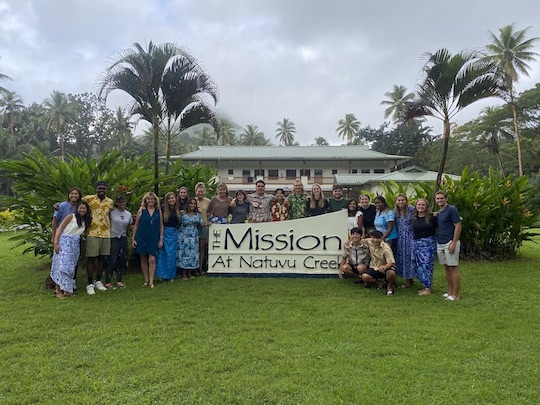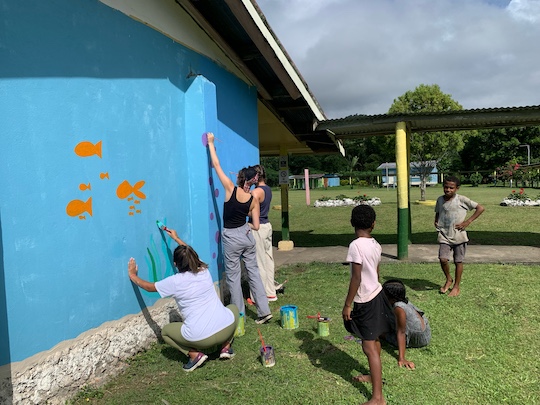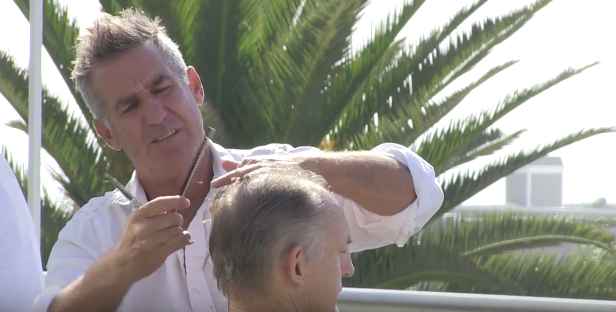
Pepperdine officials tout that studying abroad is a journey of a lifetime.
But students who have made it their goal to pursue a STEM major struggle to fit in a semester abroad.
With the minimal upper-division science and math courses offered overseas, majors such as biology, chemistry, computer science, 3/2 engineering, mathematics, nutritional science, physics and sports medicine must be strategic with their four-year plan.
Many, like Emily Sardaryan, a first-year psychology major on the pre-med track, face the disheartening decision to either let go of pursuing international programs or carry the weight of extreme course loads the moment they step back onto the Malibu campus.
Sadaryan decided to forego studying abroad.
“It was honestly pretty sad because that was one of the big things I was looking forward to and so when I kind of realized that I’m not going to be able to do that it did kind of stink,” Sardaryan said. “And it’s still kind of hard on me because I have a bunch of friends who are looking forward to going abroad and I, unfortunately, can not.”
Students majoring in science, technology, engineering and mathematics across the nation find it difficult to study abroad due to the way their classes are scaffolded. Students must weigh the pros and cons and make the decision best suited for their future.
Struggles STEM students face
Less than 2% of all college students studied abroad in 2016-17, and of that small number of participants, only 5.3% were engineering majors and 2.8% were math or computer science majors. STEM fields continue to be the most underrepresented fields in study abroad, Maria Klawe wrote in a March 6 Forbes article.
The struggle that most STEM students face is that they have more science courses that need to be scaffolded and taken in sequence, meaning they cannot simply pile up upper-division classes for when they return from abroad, Biology Professor Donna Nofziger Plank said.
Some courses are only offered in either the fall or spring semesters, making it easy to get out of sequence spending even one semester abroad.
There are several prerequisites students must complete, such as cell biology, plant or animal biology, general chemistry 1 and 2 and calculus to move forward in their upper-division courses, Cassie Kinnear, a junior biology pre-med major, said. Many STEM students take organic chemistry their sophomore year and biochemistry their junior year.
These are hard to offer abroad because of the lab requirements.
“Because it is such a foundational class, you want to make sure that it’s also taught well because it’s important to understand that class to understand biochemistry,” Nofziger Plank said.
There are some sophomore-year classes International Programs could offer that would make it easier to go abroad, Nofziger Plank said.
“Biostatistics is one,” Nofziger Plank said. “That one doesn’t require a lab, that would be one would be really helpful. That one is doable. That one is easy if you find the right person.”
Students who do go abroad will still face a heavy course load once they return to the Malibu campus to fit in all their science courses.
“I know this is really complicated to do since not everyone would need that and it requires a lab or different professor, but GEs weren’t really the issue,” Kinnear said. “It was more the major classes I had to get back to.”
Pepperdine students also have a heavy GE load with humanities and religion requirements that they must fulfill alongside their major courses.
Pepperdine’s general education program requires students to take a total of 63-64 units, compared to 48 units for UCLA’s GE program.
Students said this makes planning to go abroad seem more unattainable and arduous.
“There is no doubt that international programs are very valuable in a student’s experience but each individual student has to weigh the pros and cons themselves,” said Joe Fritsch, divisional dean of the Natural Science Division.
Extensive planning
International Programs is one of the reasons that many students choose to attend Pepperdine because the program ranks highly nationally, according to US News Best Colleges. For STEM majors to go abroad, they have to think far ahead.
“Difficult doesn’t mean impossible,” Nofziger Plank said. “It takes planning. It takes work.”
Abby Baker, first-year biology major on the pre-health track, said she tackled planning the moment she heard Pepperdine offers International Programs.
“I will say that the process was definitely pretty difficult for me because I’m a STEM major,” Baker said. “I also needed to talk to my biology advisor, who was supportive about study abroad, but she didn’t know a lot about the application so I had to talk to the faculty in residence, the IP advisor and my financial advisor. There were a lot of steps that I had to take.”
Baker said her first-semester courses limited the options she could have for International Programs.
Baker said she was put into trigonometry, algebra, intro to psychology, English composition, first-year seminar and music appreciation.
These courses prevented her from applying to any of the programs that required a language, making London the only choice without taking on extra summer school at a higher cost.
“Personally I do think that I was put at a disadvantage just because I was put in fine arts and other GEs that weren’t necessarily required to study abroad,” Baker said. “And with being a bio major it’s so hard, like next spring semester I’m packed with classes for biology, chemistry, and calculus that I don’t have room to take the GEs and the prerequisites for any other study abroad programs.”
Kinnear said she also planned carefully to attend the Lausanne, Switzerland, program for Fall 2021.
“I met with my advisor a lot to create a solid four-year plan to ensure that I could fit in all of my major classes when I got back from abroad,” Kinnear said. “I will have one semester where I am taking three lab sciences, which will be a lot, but overall I was able to spread them out nicely with GEs to make sure I am not too overwhelmed.”
Through thorough planning, STEM majors are able to make it work.
“We have a huge number of biology majors that go for a full year,” Nofziger Plank said.

Alternative STEM programs
If a semester abroad is too hard, there are summer programs such as the mission program in Fiji and the scientific research program in Kenya, which IP specifically gears toward STEM majors.
The Fiji program provides students with the opportunity to assist and serve at the Mission at Natuvu Creek. They assist with local projects and volunteer at a medical clinic and reach out to the general community.
Annie Leow, a junior economics major on the pre-med track, attended the Fiji program in July 2022 and said she had a transformative experience.
“As an individual, being there was so different from here [the U.S.],” Leow said. “The people there [Fiji] have a very different philosophy and a different way of life so learning from them and seeing them have a different perspective than America, like huge, you don’t really get that from anything but like being there.”

The Kenya program incorporates scientific research with service learning and an opportunity to explore the Christian faith. The program provides vocational training and allows students to teach children in these communities to live sustainably.
It is essential for students to experience a world beyond their own, Leow said. Students’ shared encounters abroad allow them to be more aware of others and their surroundings.
The summer programs offer an opportunity for STEM students to dig deeper into their fields and have hands-on experience that will allow them to further their careers. Through service, students also learn to be open-minded and more respectful toward different cultures.
However, the additional costs may make these summer programs out of reach.
“It’s not completely feasible for me because of the financial burden it places on me,” Sardaryan said. “Because during the school year if I were to go abroad it would be the same price plus additional cost because of flights, but during the summer it is a lot additional.”
International experiences enhance career paths
Studying abroad gives students the opportunity to learn about healthcare services on a more international scale. This prepares them for future cross-cultural collaborations.
“I think it’s very important to go into an IP program because I can’t really get certain experiences through STEM necessarily,” Baker said. “Just to experience new cultures, architecture, museums, art galleries, and things that I wouldn’t experience in just biology here [Malibu].”
Even during the short time she was abroad, Leow said it impacted the way she views her field.
“The medical aspect and being around like-minded people and the professor, Dr. Nofzinger, was very excellent,” Leow said. “The best of the best. So being able to be abroad and have fun but at the same time working toward your career is very valuable.”
In the Institute of International Education’s most recent survey of U.S. study abroad students, a majority of survey respondents reported positive skill gains from studying abroad in 14 of the 15 skills surveyed, spanning cognitive, intrapersonal and interpersonal domains. Students gained the most skills within the intrapersonal and cognitive competency areas.
Students increase their ability to communicate effectively, especially toward those from diverse cultural backgrounds, according to the survey.
They also learn to problem solve and be more resilient because of the cultural and language barriers presented when abroad.
The survey also found that studying abroad allows STEM students to be more insightful and cultivate a sense of self-awareness, which will later allow them to excel in their respective fields.
“As a student, I really learned time management, as I had to balance school work, travel local experiences, and building friendships and interacting with the community,” Kinnear said.
The connections and cultural experiences that students gain are transformative, Fritsch said.
“That ability to immerse yourself in another culture is a real fixture and plays a really important role in a student’s experience,” Fritsch said.
Taylor Kim completed the reporting for this story in Jour 241 under the supervision of Dr. Christina Littlefield and Dr. Theresa de los Santos. Dr. Littlefield supervised the web version of the story.



